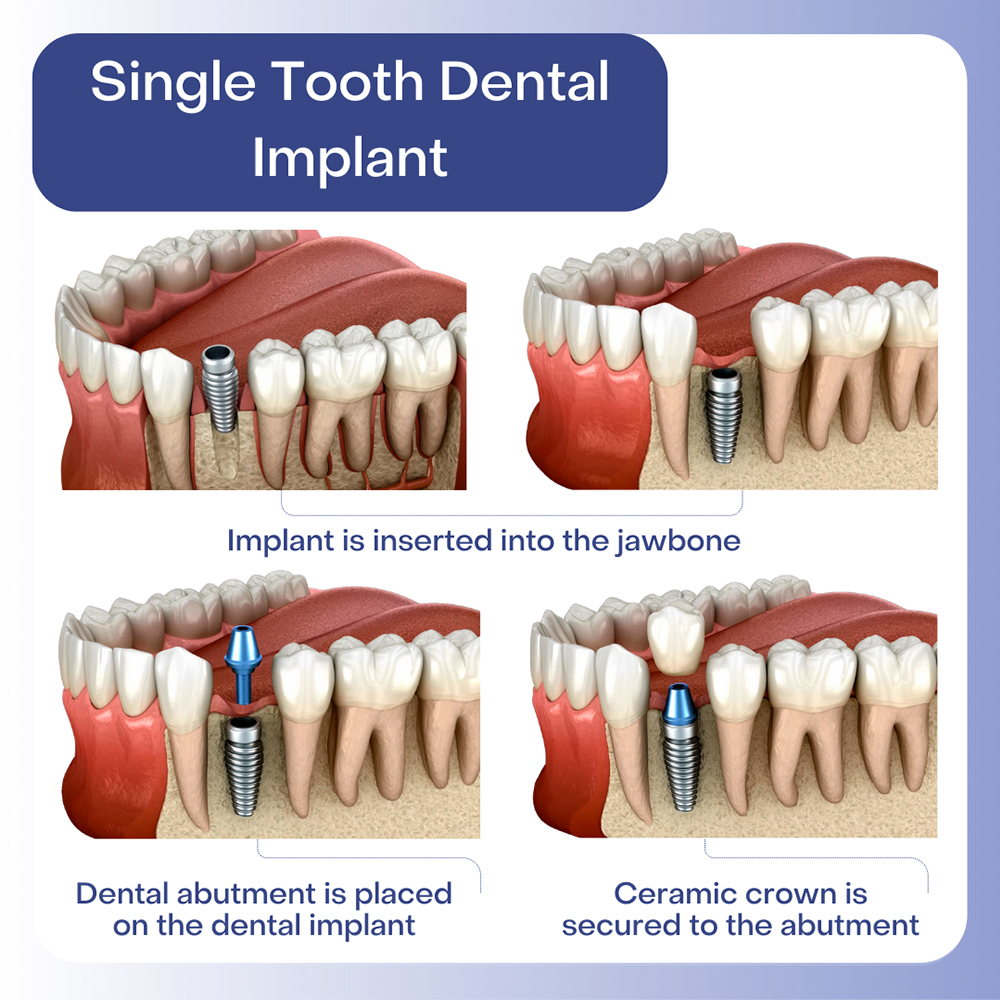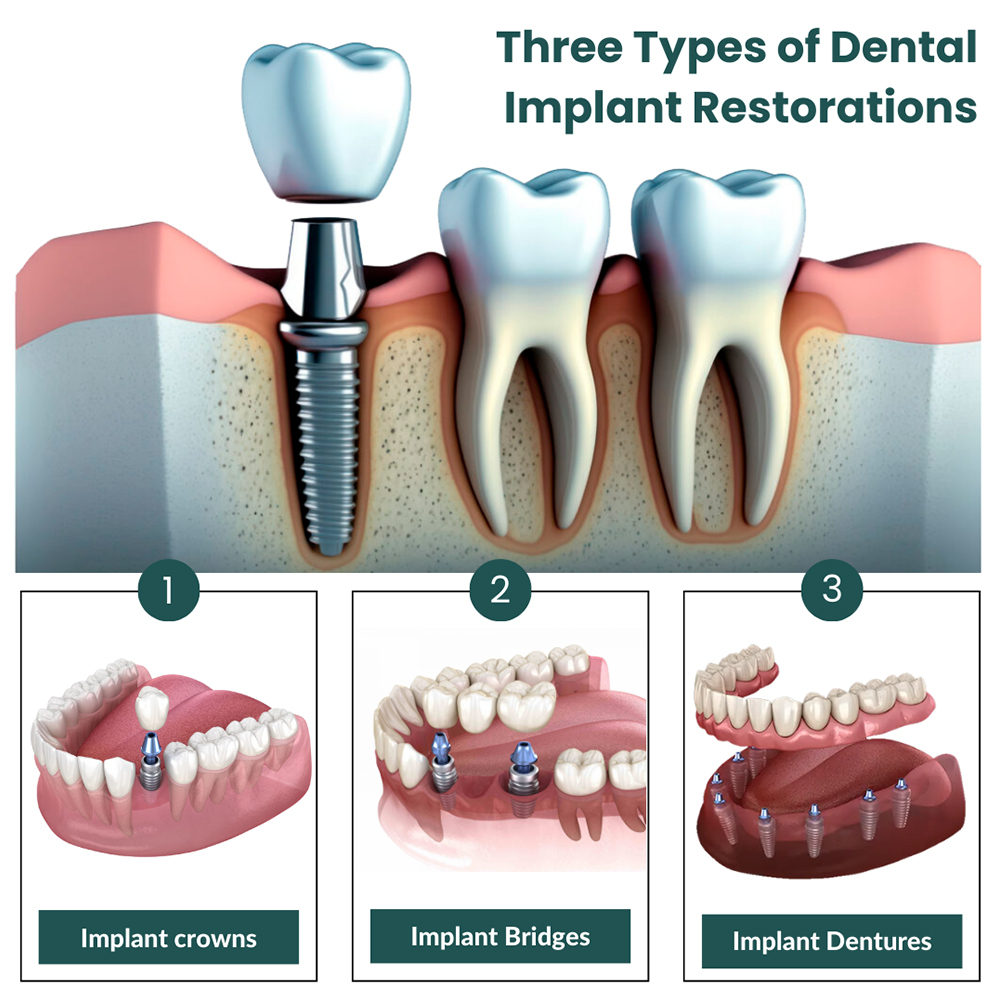3 Easy Facts About Dental Sense Explained
3 Easy Facts About Dental Sense Explained
Blog Article
The Facts About Dental Sense Revealed
Table of ContentsFacts About Dental Sense UncoveredNot known Facts About Dental SenseAn Unbiased View of Dental SenseSome Ideas on Dental Sense You Should Know
are medical gadgets surgically dental implanted into the jaw to restore an individual's capacity to chew or their appearance. They give support for synthetic (phony) teeth, such as crowns, bridges, or dentures. When a tooth is lost as a result of injury or disease, a person can experience problems such as quick bone loss, malfunctioning speech, or modifications to chewing patterns that lead to pain.Dental implant systems include a dental implant body and dental implant joint and may additionally consist of a joint addiction screw. Wisdom tooth cavity. The oral implant body is surgically put in the jawbone in place of the tooth's root. The dental implant joint is typically connected to the dental implant body by the abutment fixation screw and prolongs through gums into the mouth to support the attached man-made teeth
(https://www.huntingnet.com/forum/members/dentalsense1.html)Framework of The Dental Implant System choosing dental implants, speak to your oral supplier concerning the potential benefits and threats, and whether you are a prospect for the procedure. Things to think about: Your general wellness is an important consider figuring out whether you are a great prospect for oral implants, how much time it will require to recover, and the length of time the dental implant may stay in place.
Cigarette smoking may affect the recovery procedure and reduce the lasting success of the implant. The healing procedure for the implant body may take several months or longer, during which time you typically have a temporary abutment instead of the tooth. the dental implant treatment: Carefully adhere to the oral hygiene guidelines provided to you by your oral service provider.
How Dental Sense can Save You Time, Stress, and Money.
Implant failing can result in the need for another operation to repair or replace the dental implant system. Brings back the capacity to eat Recovers cosmetic appearance Helps maintain the jawbone from reducing due to bone loss Maintains the health and wellness of the surrounding bone and gum tissues Aids maintain nearby (neighboring) teeth secure Boosts lifestyle Damages to bordering all-natural teeth during implant placement Injury to the surrounding tissues throughout surgical procedure, such as sinus perforation Injury during surgical treatment (for instance, crack of bordering jawbone) Inadequate feature, such as really feeling like the teeth do not bite together normally A feeling that the tooth hangs or turning in position resulting from an abutment screw loosening up Implant body failing (looseness of the implant body) because of systemic infection, which may be more likely in clients with unrestrained diabetics issues as a result of regional infection in bone and gum tissues sustaining the dental implant body as a result of delayed recovery, which might be more probable in individuals who smoke Problem cleaning up the gum tissues around the implant, causing bad oral hygiene Without treatment periodontal condition Post-surgical tingling due to nerve impingement or damage Constantly inform healthcare providers and imaging professionals that you have dental implants prior to any kind of magnetic resonance imaging (MRI) or x-ray treatments.
FDA is not knowledgeable about any kind of adverse occasions reported for MRI or x-ray procedures with dental implants. Dental implants systems are usually made of products that comply with worldwide agreement standards of the International Organization for Standardization (ISO) or ASTM International. These criteria have details of what makes a secure material.

An oral implant is a structure that replaces a missing out on tooth. With screw-like tools, the surgeon inserts an implant right into the jawbone, and it acts as an anchor for an artificial tooth, called a crown.
Dental Sense Fundamentals Explained
Some people are not eligible for dental implant surgery. It is for dental surgeons to operate people with: acute illnessuncontrollable metabolic diseasebone or soft tissue illness or infectionIf these concerns are resolved, an individual can have the surgical procedure. In, dental specialists avoid operating people with: If people with any check my site one of the above undertake oral implant surgical treatment, there is a greater risk of the implant falling short.

Dental implant surgical procedure is a customized procedure. Give you time to heal. Attach the message and last crown, bridge or denture.
Next off, your specialist will very carefully position the oral implant right into your jaw. If your dental implant is near the front of your mouth, your dental practitioner will make a temporary tooth for you to wear until you recover.
Dental Sense Can Be Fun For Anyone
Your supplier can inform you what to expect in your scenario. During the healing stage, your jawbone needs to fuse to the oral implant. This process, called osseointegration, is crucial for security and long-lasting success. This process can take anywhere from 3 to nine months. Sometimes, it might take longer.
When your dental implant heals, your dental practitioner can connect the abutment (small port message) and your final repair (crown, bridge or denture). This generally takes regarding one hour to finish and might call for a second small surgical procedure. You should not feel any kind of discomfort during your dental implant treatment since your service provider will utilize medicine to numb your gum tissues.
Report this page